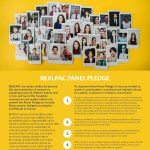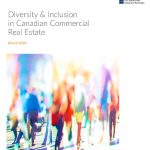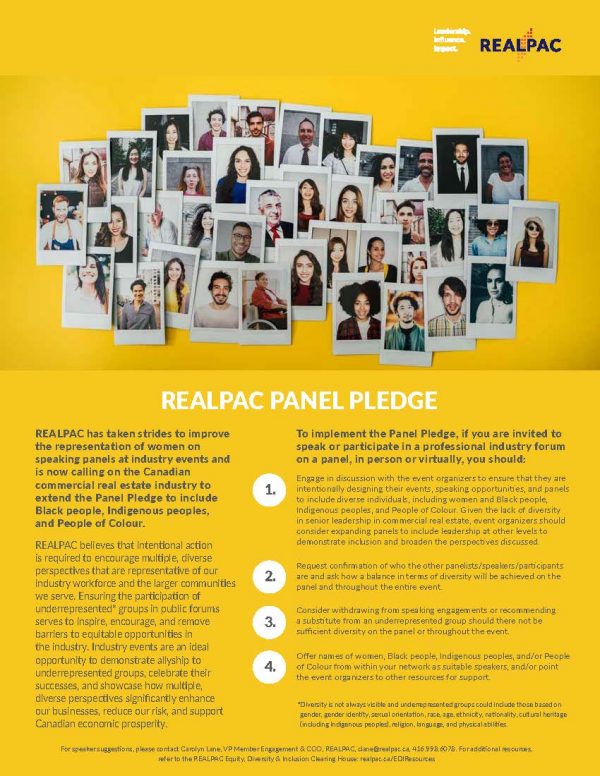Diversity, Equity & Inclusion – Resource Clearing House
The REALPAC Diversity, Equity & Inclusion (DE&I) Clearing House exists to provide REALPAC members and the Canadian commercial real estate industry with research and resources to help support DE&I within their organizations. The Clearing House will be updated regularly with new resources.
On this page:
- REALPAC Resources
- DE&I (General)
- Research Reports
- Accessibility
- Age
- Anti-Asian Violence
- Black Lives Matter
- Board Diversity
- Culture & Ethnicity
- Gender
- Gender Pronouns
- Indigenous Peoples
- LGBTQ+
- Mental Health
- Religion
- Veterans
REALPAC Resources
Webinars
A Series on Racism and Exclusion in the Workplace
REALPAC, in partnership with BOMA Toronto, CoreNet Global Canadian Chapter, NAIOP Greater Toronto Chapter, Toronto CREW, and ULI Toronto, are pleased to present a multi-series program on Racism & Exclusion in the Workplace, sponsored by KingSett Capital. This series aims to help members of the commercial real estate industry understand, address, and dismantle systemic racism in the workplace.
REALPAC Reads
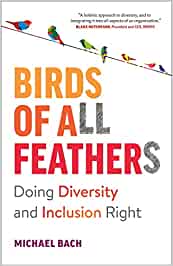
Birds of All Feathers is a timely call to action for employers, HR professionals, managers and employees to address diversity and inclusion – because it’s not just the right thing to do, but the smart thing to do.
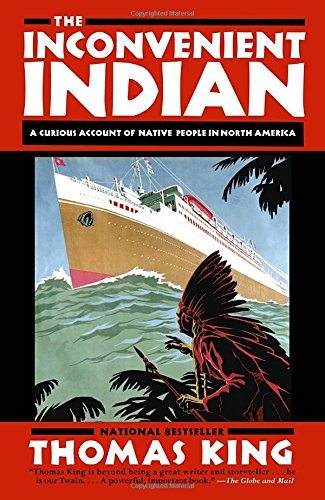
This book explores the author’s (Thomas King) critical and personal meditation on what it means to be “Indian” in North America, weaving the circular tale of the relationship between non-Natives and Natives in the centuries since the two first encountered each other.
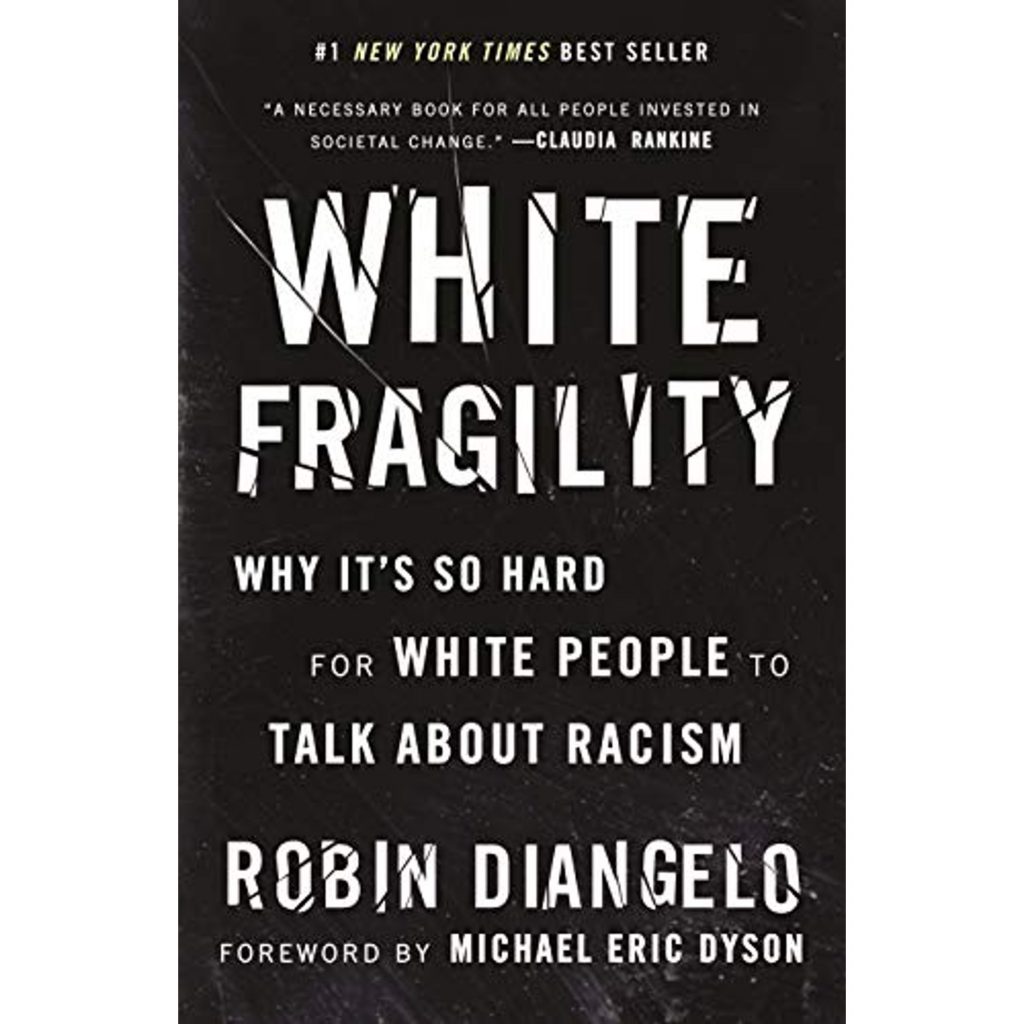
This book explores the phenomenon of white fragility and allows us to understand racism as a practice not restricted to ‘bad people’. This book examines how white fragility develops, how it protects racial inequality, and what we can do to engage more constructively.
Diversity Equity & Inclusion (General)
Canada’s Best Diversity Employers
Canada’s Best Diversity Employers recognizes employers across Canada that have exceptional workplace diversity and inclusiveness programs. This competition recognizes successful diversity initiatives in a variety of areas, including programs for employees from five groups: (1) Women; (2) Members of visible minorities; (3) Persons with disabilities; (4) Indigenous peoples; and (5) Lesbian, Gay, Bisexual and Transgender/Transsexual (LGBT) peoples.
Canadian Centre for Diversity and Inclusion (CCDI)
CCDI is a made-in-Canada solution designed to help employers, diversity and inclusion/human rights/equity, and human resources practitioners effectively address the full picture of diversity, equity and inclusion within the workplace. CCDI’s public resources include research reports and toolkits.
DiversityCanada Foundation
The DiversityCanada Foundation is a non-partisan not-for-profit which creates, facilitates, and promotes opportunities for multi-ethnic, multi-cultural, differently-abled, and diverse groups and individuals to participate in the economic, social, and cultural life of Canada and elsewhere.
Harvard Business Review – Diversity Articles
The Harvard Business Review produces many articles on diversity.
Holidays and Observances in Canada
This list provides holidays and observances in Canada generally, and those based on different religions and provinces and territories.
Law Society of Ontario – Diversity & Inclusion Survey Questions
The Law Society of Ontario has an Equality, Diversity, and Inclusion initiative to address racism and discrimination in the legal profession. Since 2009, the Law Society has been collecting licensee demographic data on a voluntary basis. The Law Society makes their Self-Identification, Inclusion, and Self-Assessment questions available to the public. Other organizations can use these questions as a model when surveying their own employees to gather demographic data.
OCAD University Inclusive Design Research Centre (IDRC)
The IDRC is a research and development centre at OCAD University where an international community of open source developers, designers, researchers, advocates, and volunteers work together to ensure that emerging information technology and practices are designed inclusively. Inclusive design is design that considers the full range of human diversity with respect to ability, language, culture, gender, age, and other forms of human difference.
Ontario Human Rights Commission – Count me in! Collecting Human Rights-based Data
This guide is intended to be a practical resource for human resources professionals, human rights and equity advisors, managers and supervisors, unions, and any other people or groups considering a data collection project on the basis of race, disability, sexual orientation, or other identifier, or seeking support to do so. This guide may be particularly helpful to readers with little or no knowledge of data collection.
Statistics Canada – Gender, Diversity, and Inclusion Statistics
Statics Canada provides extensive stats on diversity and inclusion in Canada.
Ted Rogers School of Management’s Diversity Institute at Ryerson University
The Diversity Institute conducts and coordinates multi-disciplinary, multi-stakeholder research to address the needs of diverse Canadians, the changing nature of skills and competencies, and the policies, processes, and tools that advance economic inclusion and success.
The Micropedia of Microagressions
Browse this resource to learn more about microagressions and their impact.
Research Reports
Dalhousie University and CCDI – National Diversity and Inclusion Benchmarking Study (2019)
This study was conducted by Dalhousie University and the Canadian Centre for Diversity and Inclusion (CCDI) in February 2019. The study captures national data on Diversity and Inclusion practices in Canadian organizations and the working relationships between Senior Leaders of organizations and their Diversity and Inclusion managers.
PwC – Global Diversity & Inclusion Survey (2019)
PwC conducted a global, cross-industry survey of business, D&I, and HR leaders who develop and execute their organizations’ D&I strategies to understand what programmes their organizations have in place, and the impact they are having on employee experience.
McKinsey & Company – Delivering through Diversity (2018)
This report reinforces the link between diversity and company financial performance—and suggests how organizations can craft better inclusion strategies for a competitive edge.
Accessibility
BOMA Canada 2021 Accessibility Guide
This guide is intended as an introduction to understanding the importance of accessibility, its relevance to the work we do, and how it can be incorporated into any site.
Canadian Civil Liberties Association – Workplace Accessibility in Canada
The Canadian Civil Liberties Association provides a brief overview of the legislation and case law regarding disability rights in the Canadian workplace.
Centre for Excellence in Universal Design
The Centre is dedicated to the principle of universal access, enabling people to participate in a society that takes account of human difference, and to interact with their environment to the best of their ability.
Government of Canada – Making an Accessible Canada for Persons with Disabilities
The Government of Canada overviews the Accessible Canada Act and the United Nations Convention on the Rights of Persons with Disabilities, as well as what it is doing to make the country more accessible.
Rick Hansen Foundation (RHF)
The mission of the RHF is to create and deliver innovative solutions that lead to a global movement to remove barriers and liberate the potential of people with disabilities. The RHF has created the Rick Hansen Foundation Accessibility CertificationTM (RHFAC), a rating system that uses trained professionals to evaluate the meaningful access of commercial, institutional, and multi-unit residential buildings and sites.
Age
Canada’s Top Employers for Young People
First published in 2002, Canada’s Top Employers for Young People is an editorial competition organized by the Canada’s Top 100 Employers project. This special designation recognizes the employers that offer the nation’s best workplaces and programs for young people just starting their careers.
Government of Canada – Age-friendly workplaces: Promoting older worker participation
The Government of Canada has produced a guide outlining the importance of recruiting and retaining older workers.
Statistics Canada – Generations in Canada
Statistics Canada outlines the different generational cohorts living in Canada.
Anti-Asian Violence
Fight COVID Racism
In response to addressing the growing anti-Asian racism that has intensified amidst COVID-19, Fight COVID Racism was created as a website platform dedicated to tracking and reporting anti-Asian racism and xenophobia in Canada. This project aims to validate the spectrum of experiences felt across Asian Canadian communities and seeks to use the documentation to inform future efforts for collective action against anti-Asian racism and xenophobia.
ACT2endracism
Asian Canadians Together (ACT) is a coalition of citizens and community groups concerned about rising and escalating anti-Asian sentiment. ACT is committed to providing support to the community and addressing COVID-19 related racism by providing recommendations to institutions on how to tackle systemic racism.
Project 1907
Project 1907 is a grassroots group made up of Asian women which aims to elevate Asian voices that are underrepresented and undervalued in mainstream political, social, and cultural discourse, including amplifying the voices of women.
Stop AAPI Hate
In response to the alarming escalation in xenophobia and bigotry resulting from the COVID-19 pandemic, the Stop AAPI Hate reporting center was launched on March 19, 2020. The center tracks and responds to incidents of hate, violence, harassment, discrimination, shunning, and child bullying against Asian Americans and Pacific Islanders in the United States.
Statistics Canada: Perceptions of personal safety among population groups designated as visible minorities in Canada during the COVID-19 pandemic
This article focuses on responses submitted from more than 43,000 Canadians between May 12 and 25, 2020, to a crowdsourcing data collection on the impacts of the COVID-19 pandemic on Canadian’s perceptions of safety.
Minority Rights Group International – Asian Canadians
This article outlines statistical information around Asian Canadians, their historical context, and current issues.
The Canadian Encyclopedia – Racial Segregation of Asian Canadians
This article outlines the history of racial segregation of Asians within Canada.
Government of Canada – Bystander Intervention Strategies
This resource provides safe and positive options to prevent harm or intervene when there is a risk of harassment.
Board Diversity
30% Club
The 30% Club aims to develop a diverse pool of talent for all businesses through the efforts of its Chair and CEO members who are committed to better gender balance at all levels of their organizations. The organizations have multiple chapters around the world, including a Canadian Chapter.
Canadian Board Diversity Council (CBDC)
The CBDC advances diversity on Canada’s boards through research, network building, board training, and best practice education. CBDC publishes Annual Report Cards on the representation of women, visible minorities, Indigenous people, people with disabilities, and LGBTQ+ on boards.
Harvard Law School Forum on Corporate Governance and Financial Regulation
The Forum is an online resource for discourse on corporate governance. It features articles on corporate board diversity.
Black Lives Matter
AfroBiz.ca
AfroBiz.ca was created to support Black owned businesses and Black entrepreneurs by listing Black owned businesses in local areas. AfroBiz.ca is self funded and currently home to more than 4500 Black owned businesses, Black entrepreneurs and Black organizations in Canada.
Black History Month
Every February, Canadians are invited to participate in Black History Month festivities and events that honour the legacy of Black Canadians, past and present.
Black Lives Matter
Black Lives Matter is a platform upon which Black communities across Canada can actively dismantle all forms of anti-Black racism, liberate Blackness, support Black healing, affirm Black existence, and create freedom to love and self- determine.
Black Business and Professional Association (BBPA)
Founded in 1983, the BBPA is a non-profit, charitable organization that addresses equity and opportunity for the Black community in business, employment, education, and economic development. It’s Mission is to advance Canada’s Black communities by delivering programs that support business and professional excellence, higher education, and economic development.
Black Opportunity Fund
Established in 2020, the Black Opportunity Fund (“BOF”) is a dynamic partnership between businesses, philanthropists, foundations, and the Black community to combat the impact of systemic anti-Black racism in Canada.
Black Talent Initiative
The Black Talent Initiative was born to facilitate change, access, and connections to aspiring Black talent in business. Through partnerships, internships, mentorships, and networking, BTI empowers Black leaders for the future.
BlackNorth Initiative
Led by The Canadian Council of Business Leaders Against Anti-Black Systemic Racism, The BlackNorth Initiative is on a mission to end anti-Black systemic racism throughout all aspects of our lives by utilizing a business first mindset.
Canadian Black Chamber of Commerce
The CBCC is committed to connecting Black Businesses in Canada to the Global Black diaspora and the mainstream global markets by promoting local and bilateral trade, resources, information and cultural exchange.
Careers Education Empowerment (CEE) Centre for Young Black Professionals
The CEE Centre for Young Black Professionals is a charity dedicated to addressing economic and social barriers affecting black youth ages 14 and over. Its activities are focused on youth workforce development, education, and advocacy to influence systems and policy.
Culture & Ethnicity
Diversity Resources – Cultural Diversity in the Workplace
Diversity Resources lists essential skills that employers must have when managing a diverse workplace.
Statistics Canada – Immigration and Ethnocultural Diversity in Canada
Statistics Canada provides an overview of cultural diversity statistics in Canada.
Gender
Catalyst
Catalyst is a global non-profit working with CEOs and companies across the world to help build workplaces that work for women. Founded in 1962, Catalyst produces research, practical tools, and solutions to accelerate and advance women into leadership.
Commercial Real Estate Women (CREW) Network
CREW Network was founded in 1989 to bring together women involved in the many aspects of commercial real estate to exchange information, develop business contacts, and help each other succeed professionally. The organization provides support to 11,000+ members worldwide through business networking, leadership development, industry research and career outreach. One of their key reports is Closing the Gap: Addressing Gender Bias and Other Barriers for Women in Commercial Real Estate. CREW also has several Canadian regional chapters.
MSCI – Women on Boards
MSCI Environmental, Social & Governance (ESG) Research has been reporting annually on the state of women’s representation on corporate boards of directors since 2014. This report provides an update on the state of female representation on corporate boards and in senior management for MSCI All Country World Index (AWCI) Index constituents as of October 16, 2018.
Osler – 2019 Diversity Disclosure Practices: Women in leadership roles at TSX-listed companies
This report provides a snapshot of the representation of women in leadership roles in corporate Canada. An extensive review and analysis of diversity disclosure by TSX-listed companies, summarizing results for the full 2017 calendar year as well as for the period from January 1 to July 31, 2018, was conducted.
United Nations Sustainable Development Goals – Goal 5: Gender Equality
The 2030 Agenda for Sustainable Development, adopted by all United Nations Member States in 2015, provides a shared blueprint for peace and prosperity for people and the planet, now and into the future. At its heart are the 17 Sustainable Development Goals, which are an urgent call for action by all countries – developed and developing – in a global partnership. Goal 5 focuses specifically on gender equality.
Urban Land Institute (ULI) Women’s Leadership Initiative (WLI)
The mission of the ULI Women’s Leadership Initiative is to raise the visibility and number of women leaders in ULI and the real estate industry. Canadian chapters include WLI British Columbia and WLI Toronto.
Gender Pronouns
Culture Amp – Why sharing gender pronouns at work matters
Creating a diverse and inclusive workplace can be a complex task, but the important thing is to get started. One step organizations are taking to ensure communications are inclusive is enabling conversations about people’s gender pronouns.
Time – Everything You Ever Wanted to Know About Gender-Neutral Pronouns
By now, the cultural visibility of the transgender, genderqueer and gender nonconforming community has seriously expanded the way that we view gender. And while general awareness about gender diversity has increased, there are still some technical aspects that many people continue to struggle with, chief among those being the use of gender-neutral pronouns.
Ryerson University – Why include pronouns in your email signature
Gender identity and expression are deeply personal matters. As outlined by the Ontario Human Rights Commission, gender identity refers to a person’s “internal and individual experience of gender.” This applies to whether a person identifies as being a woman, man, both, neither or anywhere within the gender spectrum. This can change throughout one’s life, meaning that a person’s gender identity may be different from what they were assigned at birth.
Forbes – Should You Put Pronouns In Email Signatures And Social Media Bios?
It’s not uncommon to see pronouns in people’s email signatures and social media bios. But it’s far from widespread.
Indigenous Peoples
Canadian Association of University Teachers (CAUT) – Guide to Acknowledging First Peoples & Traditional Territory
CAUT created this guide to recommend territorial acknowledgements for universities across Canada. Although this guide was created for universities, it can be used as a guideline for territorial acknowledgements in most major cities across Canada.
Congress of Aboriginal Peoples (CAP)
Congress of Aboriginal Peoples (CAP) is one of five National Indigenous Organizations recognized by the Government of Canada. Founded in 1971 as the Native Council of Canada (NCC), the organization was originally established to represent the interests of Métis and non-status Indians. Reorganized and renamed in 1993, CAP has extended its constituency to include off-reserve status and non-status Indians, Métis and Southern Inuit Aboriginal Peoples, and serves as the national voice for its provincial and territorial affiliate organizations.
Government of Canada – Indigenous Peoples and Cultures
The Government of Canada provides information on the three distinct groups of Indigenous peoples in Canada (First Nations, Inuit, and Métis) and their unique histories, languages, cultural practices, and spiritual beliefs.
Indigenous Canada
Indigenous Canada is a 12-lesson Massive Open Online Course (MOOC) from the Faculty of Native Studies that explores Indigenous histories and contemporary issues in Canada. From an Indigenous perspective, this course explores key issues facing Indigenous peoples today from a historical and critical perspective highlighting national and local Indigenous-settler relations. Topics for the 12 lessons include the fur trade and other exchange relationships, land claims and environmental impacts, legal systems and rights, political conflicts and alliances, Indigenous political activism, and contemporary Indigenous life, art and its expressions.
Indspire
Indspire is an Indigenous national charity that invests in the education of First Nations, Inuit and Métis people for the long-term benefit of these individuals, their families and communities, and Canada.
Inuit Tapiriit Kanatami
The national representational organization protecting and advancing the rights and interests of Inuit in Canada.
Land acknowledgements – Legal Aid Ontario
Acknowledging traditional Indigenous territories is one way to recognize contemporary and historical Indigenous presence and land rights. It is a small step towards dismantling the continued impacts of colonialism and undoing Indigenous erasure in our everyday lives.
Métis Nation
The Métis Nation is represented at the national and international levels by the Métis National Council which receives its mandate and direction from its Governing Members, the democratically elected governments of the Métis Nation within the five westernmost provinces.
Native Women’s Association of Canada
The Native Women’s Association of Canada (NWAC) is founded on the collective goal to enhance, promote, and foster the social, economic, cultural and political well-being of First Nations, Métis and Inuit women. NWAC is an aggregate of thirteen Native women’s organizations from across Canada and was incorporated as a non-profit organization in 1974.
The First Nations Major Projects Coalition
Several First Nations have formed the First Nations Major Projects Coalition (“FNMPC” or “Coalition”) for the purposes of examining: i) how ownership of major resource projects on their lands could be facilitated, and ii) how environmental practices can be improved to meet their needs.
Reconciliation & Responsible Investment Initiative (RRII)
Grounded in collective action, research and knowledge exchange, RRII is supporting Indigenous trustees and decision-makers to further align the governance of their collective financial assets with their community values. RRII is working with Indigenous decision-makers to ensure their rights, values and aspirations are reflected and upheld in their investment policies and practices including in their relationships with advisors and asset managers.
Statistics Canada – Aboriginal Peoples in Canada: First Nations People, Métis, and Inuit
Statistics Canada provides data on Aboriginal peoples throughout Canada.
Union of British Columbia Indian Chiefs
The goal of the UBCIC is to support the work of our people, whether at the community, nation or international level, in our common fight for the recognition of our aboriginal rights and respect for our cultures and societies.
Whose Land
Whose Land is a web-based app that uses GIS technology to assist users in identifying Indigenous Nations, territories, and Indigenous communities across Canada. The app can be used for learning about the territory your home or business is situated on, finding information for a land acknowledgement, and learning about the treaties and agreements signed across Canada.
LGBTQ+
CanadianProfessional Association for Transgender Health (CPATH)
CPATH is an interdisciplinary professional organization which works to support the health, wellbeing, and dignity of trans and gender diverse people.
Gay & Lesbian Alliance Against Defamation (GLAAD)
GLAAD supports LGBTQ+ acceptance and works to shape the narrative and provoke dialogue that leads to cultural change. GLAAD provides a Lesbian / Gay / Bisexual Glossary Of Terms on their website, which includes terms to avoid and defamatory language.
Pride at Work Canada
Pride at Work Canada empowers employers to build workplaces that celebrate all employees regardless of gender expression, gender identity, and sexual orientation. The organization helps to create safer, more inclusive workspaces that realize the full potential of all employees and bring down barriers to employment. Pride at Work Canada hosts learning, networking, and community events across the country, celebrating and connecting the most inclusive Canadian employers.
Re:searching for LGBTQ2S+ Health
Re:searching for LGBTQ2S+ Health is a team of lesbian, gay, bisexual, transgender, transsexual, Two-Spirit, and queer (LGBTQ2S+) and ally researchers who focus on understanding how LGBTQ2S+ people experience physical and emotional (mental) health, and how they access health services. “2S” stands for “Two-Spirit” which refers to a person who identifies as having both a masculine and a feminine spirit, and is used by some Indigenous people to describe their sexual, gender, and/or spiritual identity.
Safe Zone Project
The Safe Zone Project (SZP) is a free online resource providing curricula, activities, and other resources for educators facilitating Safe Zone trainings (sexuality, gender, and LGBTQ+ education sessions), and learners who are hoping to explore these concepts on their own.
Mental Health
Canadian Mental Health Association (CMHA)
CMHA is a voluntary organization that facilitates access to the resources people require to maintain and improve mental health and community integration, build resilience, and support recovery from mental illness.
Centre for Addiction and Mental Health (CAMH)
CAMH is Canada’s largest mental health teaching hospital and one of the world’s leading research centres in its field. CAMH is fully affiliated with the University of Toronto and is a Pan American Health Organization/World Health Organization Collaborating Centre. CAMH has a variety of courses and resources on mental health.
Religion
Ontario Human Rights Commission – Religious Rights Fact Sheet
Under the Ontario Human Rights Code, discrimination because of religion (creed) is against the law. Everyone should have access to the same opportunities and benefits, and be treated with equal dignity and respect, regardless of their religion.
Veterans
Statistics Canada – Understanding future needs of Canadian veterans
Statistics Canada outlines the future needs of the Canadian veteran population.
Veterans Affairs Canada (VAC)
VAC supports the well-being of Veterans and their families, and promotes recognition and remembrance of the achievements and sacrifices of those who served Canada in times of war, military conflict, and peace. VAC also provides demographic information of veterans across Canada.

